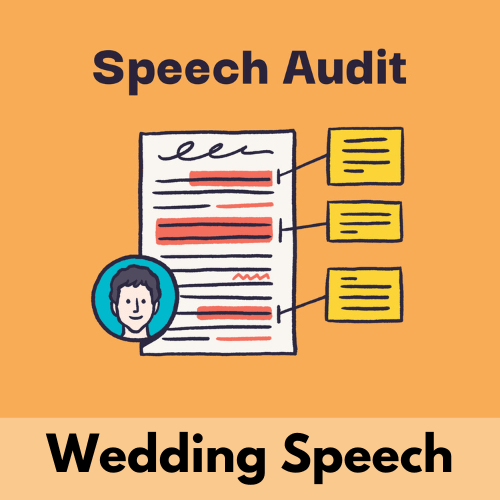Don’t let these common mistakes sink your father of the bride speech!
The five (5) father of the bride speech mistakes I see most often — and how to avoid them!
Watch time: 8 minutes
MISTAKE #1: Don’t write one!
On the big day, have a couple or six drinks and go up there in front of God, Aunt Yetta and the happy couple, and spout out whatever pops into your head. Regale them with a minimum 35 minutes of half-remembered stories about bodily functions, exes and DUIs.
MISTAKE #2: Buy someone else’s speech from the internet.
Nothing says you care like spending $19.95 and swapping out the names. Except you missed a few, so now your daughter is wondering why you keep calling her new husband “Nigel.”
MISTAKE #3: Make it long.
Real long. Forget dinner, dancing and the other speeches. Detail every single memory you have about your daughter from conception to this very evening. The groom’s 95-year-old granddad will probably still be alive at the next wedding. His toast can keep. This is your little girl we’re talking about. Filibuster that sucker.
TIP #4: Do you really need a 4th one? I think you get the point.
So how can you keep your audience engaged from beginning to end?
You don’t need a perfect wedding speech.
And you don’t have to be perfect on the day.
You don’t even have to have your speech memorized.
Your audience doesn't want perfection. They want preparation.
They want to feel that for those few minutes, they’re in good hands.
If they don’t feel that, they won’t boo or storm out or pelt you with dinner rolls.
They’ll simply check out.
Lots of faces looking at you – not listening. And not laughing.
So how can you keep your audience engaged from beginning to end?
Here are 5 ways to prepare yourself, your speech and the room for the best possible outcome:
1. DON’T WING IT.
Put some time into creating a thoughtful speech. Then practice it, and then practice it some more. Audiences can smell lazy a mile away. A great wedding speech is personal and specific. It has a beginning, middle and end. That ain’t wingable.
2. WHEN IT COMES TO LENGTH, GO WITH QUALITY OVER QUANTITY
I always suggest aiming for five minutes. It’s plenty of time to say everything you want to say, and not so long that people start wondering when it’s going to end, or worse, IF it’s ever going to end.
On paper, five minutes is about a page and half, double-spaced. If you have a lot to say and end up at 10 minutes, you’re still in the right ballpark. If you don’t have much to say, there’s not a thing wrong with a heartfelt and funny 3 minutes.
3. BE HONEST
Honesty is always the best policy. If public speaking terrifies you, but this is the only person on the planet you’d even attempt to conquer that fear for, open with that and own it. Your honesty lets the other guests see every shake and voice crack as indisputable proof of the magnitude of your affection for the person you’re speaking about – a person, by the way, whom they also adore. They want you to succeed and you’ll feel that energy coming back at you.
If you know you’re going to be a heap of tears – I’m talking to you, big sisters and dads – mention it early in your speech. Then, when the waterworks start, you can play the moment as “I told you so,” instead of feeling self-conscious. (By the way, no matter who you are, if you don’t get a lump in your throat at some point in your speech, you may not be human.)
4. MAKE SURE EVERYONE CAN FOLLOW EVERYTHING YOU’RE SAYING
I always ask clients what annoys them about other wedding speeches they’ve seen. The most frequent answer is when a speech is all ‘in jokes.’
Make sure every guest can follow every joke and every story. Imagine listening to your speech if you were someone’s plus one or aunt. It’s usually only a matter of a few words of explanation.
I had a maid of honor tell me she met the bride ‘in Complicit,’ which I assumed was a typo. When I clarified, she explained they met freshman year in a comparative literature class that had the world’s least enlightened reading list. Instead of calling it Comp Lit, they nicknamed it Complicit. With that tiny bit of explanation, we’re all in on the joke.
5. MAKE SURE EVERYBODY CAN HEAR YOU!
People want to hear your speech. If they can’t hear you clearly, they won’t react to what you’re saying. No reaction means no laughter and you’ll be distracted wondering why all your jokes are falling flat, and eventually, why you’ve lost the attention of the room. So, make sure people can hear you.
I have a very sophisticated way to determine if people can hear you. When you get to the mic, loudly ask, “Can everybody hear me?” If they can’t, they’ll tell you, and you can adjust accordingly.






